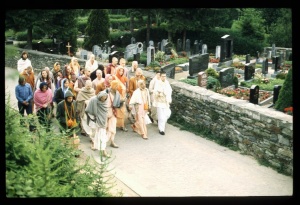SB 10.24.37: Difference between revisions
m (1 revision(s)) |
No edit summary |
||
| Line 1: | Line 1: | ||
{{info | {{info | ||
|speaker=Lord | |speaker=Lord Kṛṣṇa the Supreme Personality of Godhead | ||
|listener= | |listener=inhabitants of Vṛndāvana | ||
}} | }} | ||
[[Category:Srimad-Bhagavatam - Canto 10 Chapter 24]] | |||
[[Category:Bhagavatam Verses Spoken by Lord Krsna - Vanisource|102437]] | |||
<div style="float:left">'''[[Srimad-Bhagavatam]] - [[SB 10|Tenth Canto]] - [[SB 10.24: Worshiping Govardhana Hill|Chapter 24: Worshiping Govardhana Hill]]'''</div> | |||
<div style="float:right">[[File:Go-previous.png|link=SB 10.24.36]] '''[[SB 10.24.36]] - [[SB 10.24.38]]''' [[File:Go-next.png|link=SB 10.24.38]]</div> | |||
{{RandomImage}} | |||
{{SBnotice}} | |||
==== TEXT 37 ==== | ==== TEXT 37 ==== | ||
<div | <div class="verse"> | ||
eṣo 'vajānato martyān | :eṣo 'vajānato martyān | ||
kāma-rūpī vanaukasaḥ | :kāma-rūpī vanaukasaḥ | ||
hanti hy asmai namasyāmaḥ | :hanti hy asmai namasyāmaḥ | ||
śarmaṇe ātmano gavām | :śarmaṇe ātmano gavām | ||
</div> | </div> | ||
| Line 17: | Line 22: | ||
==== SYNONYMS ==== | ==== SYNONYMS ==== | ||
<div | <div class="synonyms"> | ||
''eṣaḥ''—this one; ''avajānataḥ''—those who are neglectful; ''martyān''—mortals; ''kāma-rūpī''—assuming any form at will (such as that of the snakes who live upon the hill); ''vana-okasaḥ''—residents of the forest; ''hanti''—will kill; ''hi''—certainly; ''asmai''—to him; ''namasyāmaḥ''—let us pay our obeisances; ''śarmaṇe''—for the protection; ''ātmanaḥ''—of ourselves; ''gavām''—and of the cows. | |||
</div> | </div> | ||
{{SBcollapse}} | |||
==== TRANSLATION ==== | ==== TRANSLATION ==== | ||
<div | <div class="translation"> | ||
"This Govardhana Hill, assuming any form he wishes, will kill any residents of the forest who neglect him. Therefore let us pay our obeisances to him for the safety of ourselves and our cows." | "This Govardhana Hill, assuming any form he wishes, will kill any residents of the forest who neglect him. Therefore let us pay our obeisances to him for the safety of ourselves and our cows." | ||
</div> | </div> | ||
| Line 31: | Line 36: | ||
==== PURPORT ==== | ==== PURPORT ==== | ||
<div | <div class="purport"> | ||
Kāma-rūpī indicates that the form of Govardhana can manifest as poisonous snakes, wild animals, falling rocks and so on, all of which are competent to kill a human being. | ''Kāma-rūpī'' indicates that the form of Govardhana can manifest as poisonous snakes, wild animals, falling rocks and so on, all of which are competent to kill a human being. | ||
According to Śrīla Śrīdhara Svāmī, the Lord presented six theoretical points in this chapter: 1) that karma alone is sufficient to determine one's destiny; 2) that one's conditioned nature is the supreme controller; 3) that the modes of nature are the supreme controller; 4) that the Supreme Lord is simply a dependent aspect of karma; 5) that He is under the control of karma; and 6) that one's occupation is the actual worshipable deity. | According to Śrīla Śrīdhara Svāmī, the Lord presented six theoretical points in this chapter: 1) that ''karma'' alone is sufficient to determine one's destiny; 2) that one's conditioned nature is the supreme controller; 3) that the modes of nature are the supreme controller; 4) that the Supreme Lord is simply a dependent aspect of ''karma''; 5) that He is under the control of ''karma''; and 6) that one's occupation is the actual worshipable deity. | ||
The Lord presented these arguments not because He believed them but rather because He wanted to stop the impending sacrifice to Indra and divert it to Himself in the form of Govardhana Hill. In this way the Lord desired to agitate that falsely proud demigod. | The Lord presented these arguments not because He believed them but rather because He wanted to stop the impending sacrifice to Indra and divert it to Himself in the form of Govardhana Hill. In this way the Lord desired to agitate that falsely proud demigod. | ||
</div> | </div> | ||
__NOTOC__ | </div> | ||
</div> | |||
<div style="float:right">[[File:Go-previous.png|link=SB 10.24.36]] '''[[SB 10.24.36]] - [[SB 10.24.38]]''' [[File:Go-next.png|link=SB 10.24.38]]</div> | |||
__NOTOC__ | |||
__NOEDITSECTION__ | |||
Revision as of 02:18, 22 May 2021

A.C. Bhaktivedanta Swami Prabhupada
Please note: The synonyms, translation and purport of this verse were composed by disciples of Śrīla Prabhupāda
TEXT 37
- eṣo 'vajānato martyān
- kāma-rūpī vanaukasaḥ
- hanti hy asmai namasyāmaḥ
- śarmaṇe ātmano gavām
SYNONYMS
eṣaḥ—this one; avajānataḥ—those who are neglectful; martyān—mortals; kāma-rūpī—assuming any form at will (such as that of the snakes who live upon the hill); vana-okasaḥ—residents of the forest; hanti—will kill; hi—certainly; asmai—to him; namasyāmaḥ—let us pay our obeisances; śarmaṇe—for the protection; ātmanaḥ—of ourselves; gavām—and of the cows.
Translation and purport composed by disciples of Śrīla Prabhupāda
TRANSLATION
"This Govardhana Hill, assuming any form he wishes, will kill any residents of the forest who neglect him. Therefore let us pay our obeisances to him for the safety of ourselves and our cows."
PURPORT
Kāma-rūpī indicates that the form of Govardhana can manifest as poisonous snakes, wild animals, falling rocks and so on, all of which are competent to kill a human being.
According to Śrīla Śrīdhara Svāmī, the Lord presented six theoretical points in this chapter: 1) that karma alone is sufficient to determine one's destiny; 2) that one's conditioned nature is the supreme controller; 3) that the modes of nature are the supreme controller; 4) that the Supreme Lord is simply a dependent aspect of karma; 5) that He is under the control of karma; and 6) that one's occupation is the actual worshipable deity.
The Lord presented these arguments not because He believed them but rather because He wanted to stop the impending sacrifice to Indra and divert it to Himself in the form of Govardhana Hill. In this way the Lord desired to agitate that falsely proud demigod.